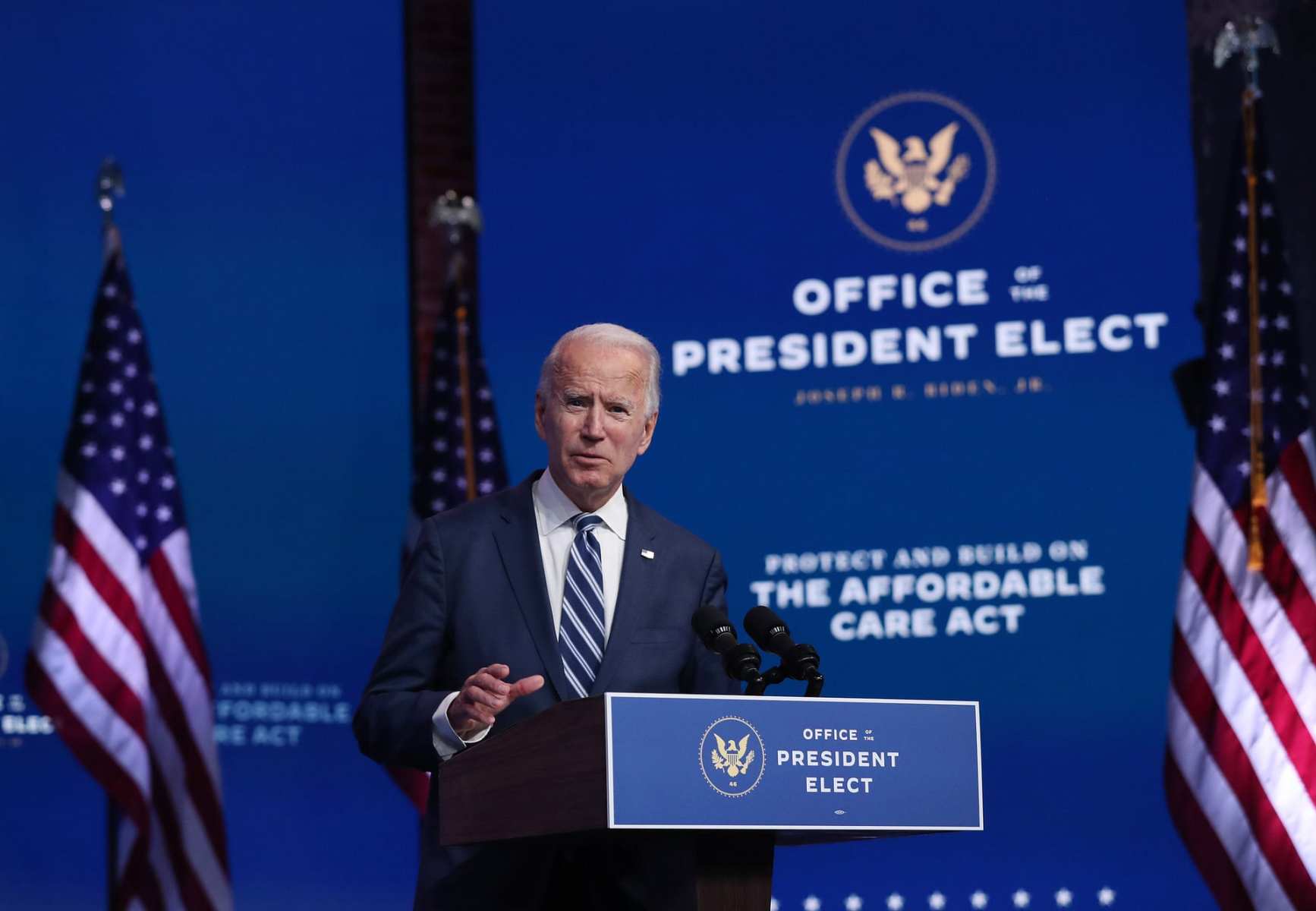We’re the only newsroom dedicated to writing about gender, politics and policy. Subscribe to our newsletter today.
With the inauguration just a few months away, President-elect Joe Biden is emphasizing the work his administration could do to expand health care access, building on and dramatically expanding the regulations and coverage made available through the Affordable Care Act, including its gender-based protections.
“Beginning on January 20, Vice President-elect Harris and I, we will do everything in our power to ease the burden of health care on you and your families,” Biden said Tuesday. In particular, he said they would pursue “a dramatic expansion of health care coverage and bold steps to lower health care costs.”
But when Biden is sworn in come January, he could face an uphill battle to enact his agenda.
Biden’s plan could have significant gender implications. He has proposed expanding coverage through a public insurance option and legislating more generous subsidies for people buying marketplace plans. Federal data shows that women are more likely to cite high health costs as a barrier toward health insurance; they are also more likely to buy coverage on the individual marketplace. A fifth of transgender people are uninsured, more than twice the national rate — and expanding access to affordable coverage could help close that gap.
But certain aspects of Biden’s health care plan could be dead on arrival, given the Congressional makeup. Democrats are expected to hold the House of Representatives, but Senate elections are ongoing. Currently, Democrats have 48 Senate seats; Republicans have 49 and are expected to pick up Alaska. Both of Georgia’s senate seats have gone to a runoff and won’t be elected until early 2021.
The Supreme Court will also be a major factor in the ACA’s future. The court is currently weighing a legal challenge that could overturn the entire law, or at the very least, its pre-existing conditions protections. (The court, which heard oral arguments Tuesday, will issue a ruling sometime in the coming months.)
Congress could theoretically pass legislation to maintain the ACA, but there is little Biden can do independently if the justices ultimately vote to strike down or dramatically scale back the law — though such an outcome appears unlikely.
If the ACA stands, the new administration could use its own authority to dramatic effect — even without Congress — undoing many of the regulations issued by President Donald Trump and putting in place more funding and health care protections.
“It’s big operational things they might do,” said Katie Keith, a Georgetown University law professor and health policy expert. “There’s straight-up rollback of Trump administration initiatives, and pushing the envelope.”
Supporting the existing ACA
Simply having the White House be interested in enforcing and supporting the current iteration of the ACA could make a difference, experts agree. The Trump administration cut funding for “navigators,” which are people who are paid to guide enrollees through their ACA coverage options, and declined to open up a special enrollment period for people to buy insurance during the COVID-induced economic downturn.
The Biden administration could use its executive authority to reverse course on both of those without Senate buy-in. And both changes would affect women in particular, since they are more likely to buy insurance on the individual marketplace and are more likely to have lost jobs — and, potentially, health insurance — during the coronavirus pandemic.
Experts also say a President Biden would likely undo many of the regulations issued under Trump, especially those that undercut the ACA’s protections for people with pre-existing conditions and standards for what health insurance must cover.
Private insurance
On the private insurance side, Biden has indicated he would issue rules to reverse the expansion of so-called “short-term, limited-duration plans” put in place by Trump’s Department of Health and Human Services. Those plans are not sold on the ACA-regulated individual marketplace, and are meant to be stopgap insurance plans lasting just three months – but under Trump, people have been able to buy them for a year at a time, renewable for three years.
Those plans, called “junk insurance” by critics, aren’t required to cover people with pre-existing conditions — a category that more often includes women and LGBTQ+ people — and have bare-bones coverage requirements that often don’t include benefits such as pregnancy-related care, mental health or prescription drugs.
Experts worry short-term plans, which are cheaper than marketplace coverage, can lull people into a false sense of having adequate insurance, only to be left hanging in case of actual medical need. The burden is heightened for women and LGBTQ+ people, who also have higher rates of anxiety and depression, and are more likely to forgo prescriptions because of cost.
“The benefits are horrible for women. None of them include maternity care,” said Laurie Sobel, the associate director for women’s health policy at the Kaiser Family Foundation. “In terms of feeling like you have coverage and affordability [and then not having it] — those are things that tend to strike women more.”
Transgender health care
Under President Barack Obama, the government interpreted the ACA’s anti-sex discrimination protections to prohibit denying people health care based on their gender identity. The Trump administration sought to walk that back, though its proposed new rule never took effect.
Biden has promised to reverse the Trump administration changes, restoring ACA protections for transgender people. But his administration could go further, Keith said, issuing regulations that also explicitly prohibit health care discrimination based on sexual orientation, something the Obama administration never did.
That protection would also have firmer legal standing now, she argued, following a July Supreme Court ruling that found sex discrimination prohibitions also applied to gender identity and sexual orientation.
“I think there’s a question of, are there ways they go further than what the Obama administration did,” she said. “Some of the things the Obama administration did weren’t enough at the time. It’s definitely not enough now.”
Reproductive health
Biden said he would increase access to abortion and contraception — though some of those changes could run up against an unfriendly judiciary.
As president, Trump has sought to undermine abortion access in particular, issuing rules to bar health care providers from the federal Title X program — which financially supports family planning services — if they refer patients to abortion services.
The Title X rule resulted in more than 1,000 family planning clinics leaving the program, including more than 400 Planned Parenthood affiliates. Those clinics are often responsible for providing contraception, cancer screenings and other preventive health care.
Reversing that regulation would be fairly easy to do. But other changes — such as reversing Trump-era efforts to undercut contraceptive coverage, which is guaranteed under the ACA — will be much harder. The Trump administration, backed by multiple Supreme Court rulings, has argued that employers could opt out if they had a moral or religious objection to birth control.
Sobel imagined the new White House might take steps to limit cases in which an employer can claim a moral exemption from contraceptive coverage. But new family planning regulations would likely be subject to litigation, she said. It’s unclear how either the federal judiciary or Supreme Court — the latter of which now has three Trump-appointed justices — would rule. And again, if the ACA is struck down, those questions could become meaningless.
“Obviously the thing on everyone’s mind is the ACA case,” Sobel said.





